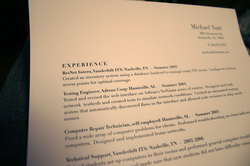
As an immigration lawyer I talk to people often who are facing the same quandary: why would an employer want to sponsor an H-1B in this economy?
I usually tell people: this is a big country. There is a willing employer out there. You have to find it, and once you do, that employer may well be willing to sponsor your green card as well.
Over the years, we've noticed some trends. People looking for H-1B sponsorship will focus their inquiries on the biggest companies, like Oracle or Microsoft or Accenture. Larger companies can afford to be picky, because everyone is applying to them. The fact that you need sponsorship will usually hinder you in these job applications.
With smaller companies, however, the prospective H-1B applicant enjoys more leeway. Smaller companies don't have legions of hungry jobseekers spamming their HR department with resumes. And so they tend to be more willing to go through the extra paperwork involved in an H-1B or even an employment-based (EB-2 or EB-3) green card.
The problem with smaller companies, though, is that they are scrutinized more by USCIS. Smaller companies are seen as riskier. They may not have the organizational complexity to justify the H-1B job. Questions may arise as to their ability to pay the prevailing wage. They are more likely to be audited. They are seen sometimes as "third party job shops" - a situation described by the Neufeld Memo of Jan. 8, 2010 as where the employer is the employer only on paper, whereas the H-1B employee reports to work at a third-party client site and answers to the client, not the H-1B employer. Sometimes USCIS questions whether the job is really a "specialty occupation" (ie, does it even require a bachelor's degree).
That's where the lawyering comes in. When working with a smaller company (that might not have much experience with the H-1B process) it is absolutely essential to have competent legal counsel familiar with the areas USCIS likes to scrutinize. For one other success story, click here.
In the IT industry, a little bit of foresight and planning can save a lot of time responding to a nasty Request for Evidence (RFE). For example, if an IT job will not require travel and the employee will be working out of the employer's business location, it makes good sense to highlight that several times in the H-1B petition. Why? Because that way USCIS fears are allayed that the employer is just sending the employee to client sites. If the employee is going to be primarily working on a client site, then special care needs to be taken in drafting the petition. Or else a very nasty RFE will issue.
Sometimes the solution is to do a part-time H-1B, especially if the company is newer, less capitalized, or does not have the organizational complexity to support a full-time H-1B.
In any case, working with counsel familiar with the H-1B regulations is essential to the success of a petition filed by a smaller company. And the applicant should also take pains to ensure that after the H-1B is filed, the company will not "bench" them. "Benching" is when an employer only pays the employee when there is an active contract, and if the employee is in non-productive status, the employer does not pay anything. This is illegal and can result in payment of not only back wages to the employee, but hefty fines and other consequences for other H-1B petitions the employer might file.
So a prospective employee staring at the end of the F-1 or OPT rope should not lose heart. There are jobs out there. The focus should be on the type of employers who are more likely to be willing to go through the H-1B and subsequent paperwork.
How to find a job?
- Do not focus on larger companies unless you have truly stellar credentials (Ivy League, high GPA, etc.)
- Go to local networking events. There are literally hundreds of business unions, meet-and-greets organized by the local chamber of commerce, and other events organized to help businesses interact and mutually benefit from each other. These are where executives from smaller companies go to network. You probably won't get your job by firing off resumes from your laptop.
- Plug your resume and credentials on social media such as LinkedIn.
- Consult an immigration lawyer who can advise you about your particular situation and arm you with knowledge you can take to a prospective employer.
- Smaller companies want to know what skill you bring that will enable them to attract larger, more affluent clients. Learn to research small company profiles and target the ones who seem to be missing what you can offer.
Here is a list of websites to help such applicants begin their job search:
- My Visa Jobs: http://www.myvisajobs.com/H1B_Visa.aspx
- Immihelp: http://www.immihelp.com/visas/h1b/filing-h1b-petition.html
- ehow: http://www.ehow.com/how_2100035_file-h1b-visa.html
- DOLETA: http://www.foreignlaborcert.doleta.gov/h-1b.cfm#fil
- H1Base: http://www.h1base.com/visa/work/H1B%20Visa%20Application%20Regular%20Process/ref/1166/ (at the bottom)
- Happy Schools Blog: http://www.happyschoolsblog.com/h1b-2013-quota-checklist/
- Path 2 USA: http://www.path2usa.com/h1b-visa-guide
- Indeed.com: www.indeed.com/q-H1b-jobs.html
- H1BVisaJobs: http://h1bvisajobs.com/
- DesiOPT: http://www.desiopt.com/
- H1VisaJobs: http://www.h1visajobs.com/
- H-1B Wiki: http://h1bwiki.com/h1b-sponsors/ (Fan Page: http://www.facebook.com/h1bwiki)
- OPT Nation: http://optnation.com
updated 3/1/2016



 RSS Feed
RSS Feed
